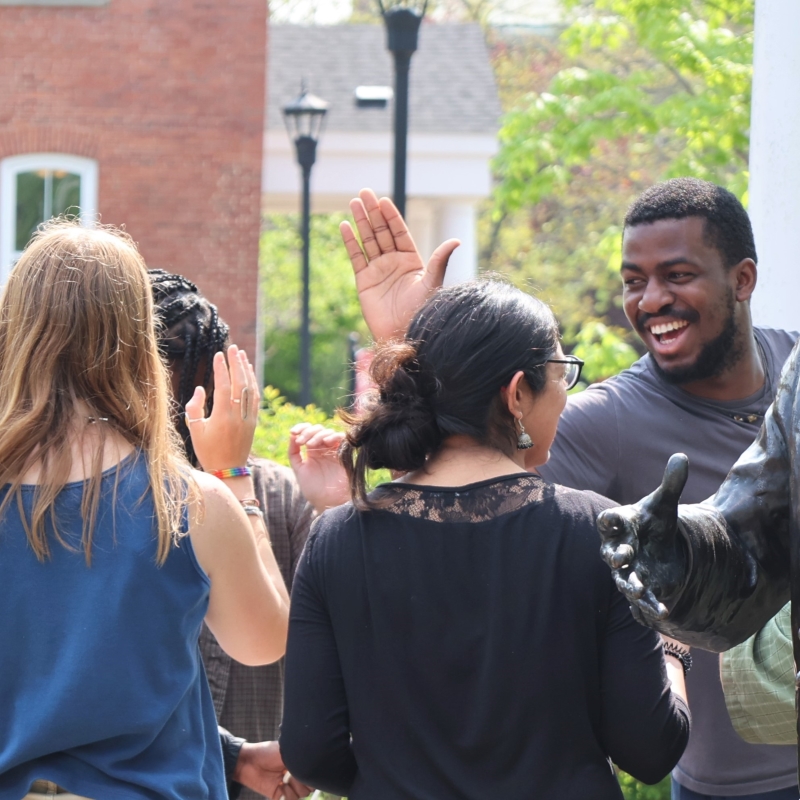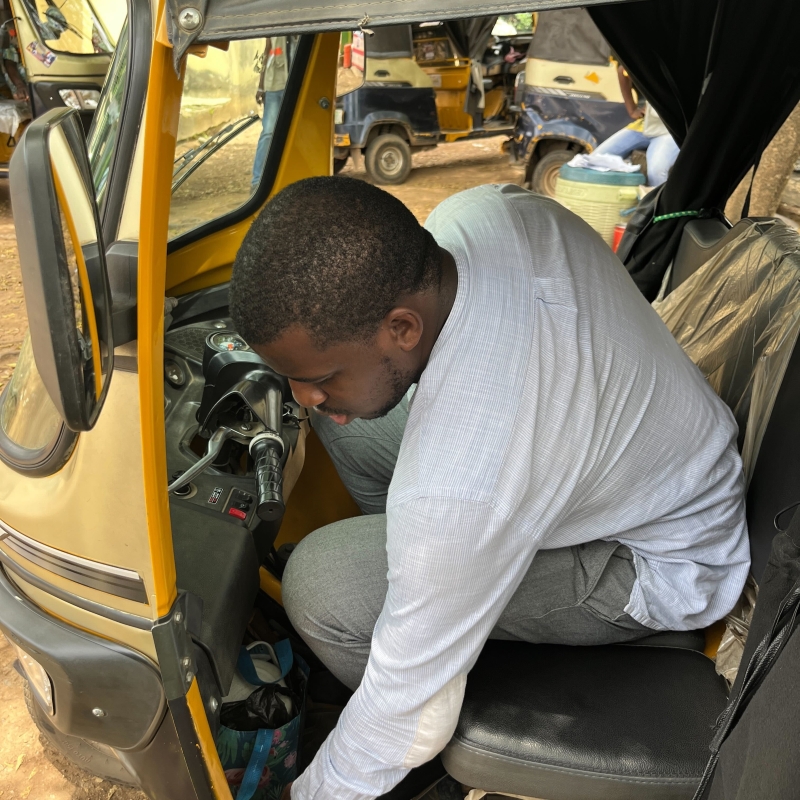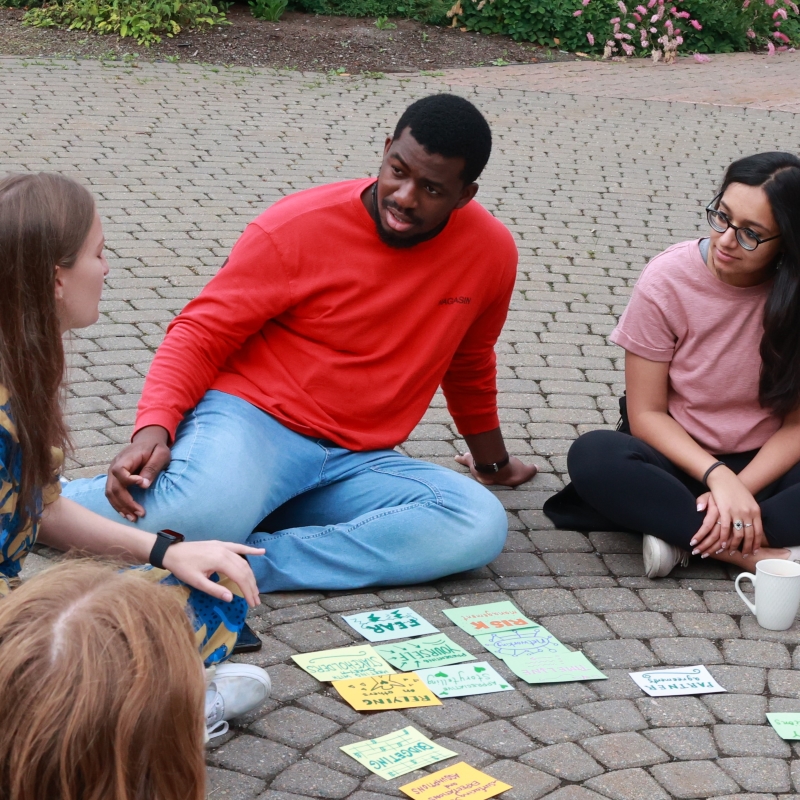Anthony Ighomuaye is in Nigeria where he is using his Pathy Foundation Fellowship to convert rickshaws from fuel to solar energy, helping drivers save on fuel costs and power their homes while minimizing negative environmental impacts.
“Rickshaws are very common in emerging markets and are one of the most common forms of transportation as it’s accessible to almost everybody regardless of socioeconomic status – it’s one of the most affordable means of transportation,” Anthony explains.
Anthony has been working with rickshaw drivers in Lagos, Ibadan, and Benin City to learn more about the challenges and opportunities they face in the industry.
“A good number of rickshaw drivers belong to the lower socio-economic groups in the society and so market forces usually affect them in a very huge way – fuel price, inflation, price of groceries, and more,” Anthony explains.
“What I found out was that these drivers are really saddled with the high cost of fuel and high cost of maintaining the vehicles which leads to a heavy decrease in how much money they can take home. The majority of people who drive rickshaws in this part of the world are men who have to provide for their families, and the income that they take home, it’s usually not enough to take care of themselves, their spouse, and often two or three children.”
Anthony was born in Lagos, Nigeria and grew up in different parts of Nigeria including Ago-Iwoye, Warri, Benin-City, and Port-Harcourt. He moved to Canada in his teenage years.
“I believe it’s important to help strengthen the communities we know best, and so I really wanted to do this as close to home as possible. The families that we are implementing this solution with – I can see myself in their children, and they can see themselves in me,” he explains.
“I want to be a leader in my community, not just for myself, but for the children of the rickshaw drivers who are able to see a guy who looks like them, who speaks like them, and is actually doing this. It’s a sense of responsibility, a sense of nationality, and a sense of just being able to support rural environments. Plus, I have a passion for mobility and sustainable energy systems.”
The Pathy Fellowship has helped me to marry entrepreneurship with social impact. You can be an entrepreneur and do good, and people are truly better off – not in the sense of ‘I sell you something and you buy something from me’, but you own a piece of what you bought from me, and I own a piece of what I’ve sold to you, and we all have accountability to each other.
We all uplift one another. We grow.
Learning from local rickshaw drivers
Having previously worked as an engineer for an electric vehicle company, Anthony saw an opportunity to bring his skills home to help improve the environmental impacts of transportation.
“They have to buy this fuel and they can be subjected to fuel scarcity at a moment’s notice,” Anthony explains.
“So, some of the drivers dilute the fuel with additives or they buy this ‘fake fuel’ that works but it doesn’t burn properly, technically speaking. When it starts emitting the soot through the exhaust, the pollution is way higher. The drivers have to inhale this, and so do passengers and passersby.”
In speaking with rickshaw drivers, Anthony learned that to bring them on board with an energy transition, he needed to approach the issue from an economic perspective not an environmental one. Some drivers, he says, are not aware of climate issues, while for others it’s just not a priority because they need to focus on meeting their most basic needs.
“I need to be able to say, ‘let’s put more money in your pocket’. Then, on a global scale, we can also protect the environment. Everyone wins.”
Designing a solution
With input from the drivers, Anthony is working to design a solution that benefits both the environment and the drivers – while ensuring the new technology and processes are accessible and sustainable to maintain. This has required adaptability as Anthony navigates relationships with international suppliers, local regulators, and the interests of the community he is intent to serve.
Though the drivers see the benefit of cost savings by switching from fuel to electricity, allowing them to take home a greater share of their daily earnings, how will they charge their converted vehicle if they don’t have electricity at home? And if the time to charge the vehicle takes several hours, will they miss out on business every time they need to ‘refuel’?
The answer, Anthony says, is two-fold. Drivers are provided a charged battery for the electric vehicle upon conversion. Instead of parking for long hours at charging stations, the battery can be swapped for a freshly charged one in minutes.
“This is where income generation comes in – we become the gas stations now, but for battery swapping. The whole goal is to mirror the behavior of when they used fuel, and we adapt to that existing behavior,” Anthony explains.
Anthony says the price of fuel has tripled since his last visit to Nigeria one year ago, and people are anxiously looking for alternatives. Many drivers finance their vehicles, and with more of their earnings going to pay high fuel costs, some fall behind on their payments.
“Rickshaw drivers are losing their vehicles as I speak,” he explains.
Increasing fuel costs are not only impacting transportation. Many households rely on fuel-powered generators to power their homes. For those with a converted rickshaw, it can help here too.
“Now, you can drive your (electric) vehicle home and it becomes a generator for you to power your home,” Anthony explains.



Sustainability and social enterprise
While choosing to design and introduce new electric vehicles to market could have been an easier task, Anthony says choosing to participate in a circular economy was a decision central to achieving his overarching goals.
“The biggest question I asked myself is, ‘what happens to the old one?’ If I have a gasoline vehicle and I introduce an electric vehicle, somebody is still driving that gasoline vehicle. Now I just have two vehicles. There’s no positive outcome there. Instead, we recognize that the old vehicle still holds value.”
The Pathy Fellowship supports graduating students from partner universities with training, mentorship, and funding to make a sustainable impact in their chosen community while developing as leaders. Anthony knew he wanted to be an entrepreneur, and he says the Fellowship has helped him navigate that journey.
“The Pathy Fellowship has helped me to marry entrepreneurship with social impact. You can be an entrepreneur and do good, and people are truly better off – not in the sense of ‘I sell you something and you buy something from me’, but you own a piece of what you bought from me, and I own a piece of what I’ve sold to you, and we all have accountability to each other. We all uplift one another. We grow.”
Are you a graduating student from UOttawa, McGill, Carleton, StFX, Bishop’s, or Queen’s University? You may be eligible to apply.
To learn more about the Pathy Foundation Fellowship, visit pathyfellowship.com
